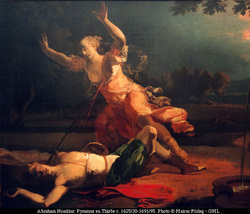
Spirits Of Another Sort Workshop Journal #2- Same/Different
In this follow up post, Becky Leifman recently sat down with Sylvia Morsillo, our Flute the Bellows Mender/Thisbe to talk to her about her experience working on the piece. Enjoy and thanks for reading!
-Gregg Mozgala, Artistic Director

My heart exploded with joy when I heard about "Spirits of Another Sort." A. It’s my favorite Shakespeare play and B. I was going to be part of being able to offer individuals with developmental disabilities the rare opportunity to be a paid actor. I was in.
I sat down with Sylvia, who is playing Flute/Thisbe in the workshop.
***
B: How did it feel to audition for a play?
S: Nerve-wracking a little bit but, it was fun. It was relaxed. I’ve never auditioned before. It was a new experience for me. I’ve done acting before in CO/LAB.
B: How did it feel to know you got the role?
S: Great! I felt like “Wow! I now have a temporary job.”
B: How is this different than other things you’ve done before?
S: It’s a paying job. The rehearsals are much longer. They’re 3 hours long.
B: What do you do in those rehearsals?
S: We do what a lot of acting companies do when they’re rehearsing. We do body & voice exercises. It leads to warming up our voices for when we speak the lines. It prepares you for memorizing your lines and your cues.
B: I always find that memorizing is only a tiny chunk of the battle. The challenge is perhaps pursuing your intentions and playing your character truthfully. How do you feel the rehearsals have helped with that?
S: We’re putting expression in what we’re saying and breaking down the line and forming it into our own words so that we understand what the line means. In depth… paraphrasing.
B: So once you’ve done that - the paraphrasing - how does that inform your character?
S: It makes it easier to study the lines. It tells you what your character’s personality is like.
B: And what about the language - given to you so beautifully by Shakespeare?
S: Olde English. Language that we don’t use today.
B: Then how do you decipher what it means?
S: By saying the lines in our own words and looking up what the word means in the Shakespeare dictionary.
B: What word do we say now that may have to be looked up in 500 years? When someone is watching a play about our time?
S: “Futurama.” Or the phrase “What’s Up?”
B: How would Shakespeare say What’s up?
S: (gets out script)... Maybe there’s something in the play… “How Now?”
B: Sylvia, “How now?”
S: Coffee.
B: Any final reflections?
S: It takes a lot of hard work and sacrifice meaning the whole time you’re studying. All day every day. It’s a new and exciting experience working with wonderful people who are very helpful in helping you to memorize certain things that you need to know for the play.
 RSS Feed
RSS Feed